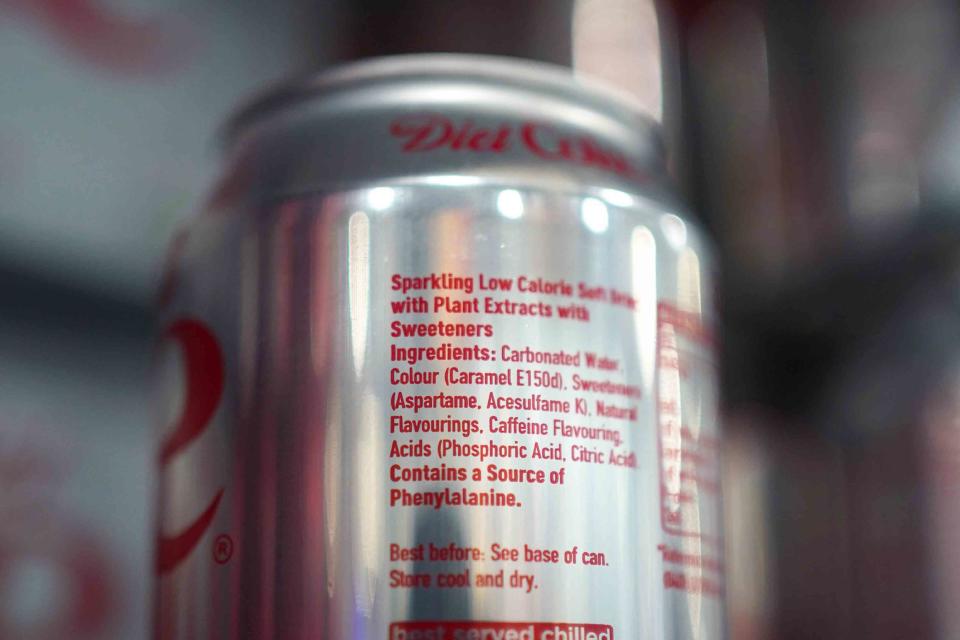What Does the World Health Organization Have to Do With Your Diet Coke?
Aspartame is found in many sugar-free products, including diet sodas, chewing gum, cough drops, and dessert.

Yui Mok / PA Images via Getty Images
An artificial sweetener found in everything from zero-calorie sodas (i.e. Diet Coke and Diet Pepsi) and sugar-free desserts to cough drops and chewing gum could soon be placed into the category of potentially cancer-causing ingredients by the end of next month. According to a Reuters report. The International Agency for Research on Cancer (IARC) and the World Health Organization (WHO) may be planning to list aspartame as being “potentially carcinogenic to humans.”
A spokesperson for IARC told Reuters that the agency’s additives committee "conducts risk assessment, which determines the probability of a specific type of harm (e.g. cancer) to occur under certain conditions and levels of exposure." The outlet also notes that the organizations’ most recent findings will not define the parameters for “safe consumption” of aspartame, as those recommendations will come from separate committees at a later date.
The IARC has four categories for the cancer risk of certain chemicals, foods, products, and even some professions. Aspartame would be placed in Class 2B, which means it “possibly” causes cancer. Some of the other items in that same category include whole-leaf aloe vera extract, certain pickled vegetables, carpentry and joinery, some dry cleaning chemicals, and “weapons-grade tungsten.”
Related: California Lawmaker Proposes Ban on Skittles
Aspartame was first approved for use by the U.S. Food and Drug Administration (FDA) in 1981 and, according to The Telegraph, it is an ingredient in 95% of all carbonated diet drinks as it is also around 200 times sweeter than natural sugar. Currently, the FDA’s acceptable daily intake for aspartame is 50 milligrams per kilogram of bodyweight per day — to hit that number, you’d have to drink over a dozen cans of diet soda every day, depending on the amount of aspartame in each beverage.
Unsurprisingly, trade organizations that champion the use of aspartame and other sweeteners have not been thrilled with the committee’s findings.
“IARC is not a food safety body. The World Health Organization’s Joint FAO/WHO Expert Committee on Food Additives (JECFA) is currently conducting a comprehensive food safety review of aspartame and no conclusions can be drawn until both reports are published,” Frances Hunt-Wood, Secretary General of the International Sweeteners Association, said in a statement. “Aspartame is one of the most thoroughly researched ingredients in history, with over 90 food safety agencies across the globe declaring it is safe, including the European Food Safety Authority, which conducted the most comprehensive safety evaluation of aspartame to date.
The International Council of Beverages Associations (ICBA) echoed those sentiments. “While it appears IARC is now prepared to concede that aspartame presents no more of a hazard to consumers than using aloe vera, public health authorities should be deeply concerned that this leaked opinion contradicts decades of high-quality scientific evidence and could needlessly mislead consumers into consuming more sugar rather than choosing safe no- and low-sugar options, all on the basis of low-quality studies,” ICBA Executive Director Kate Loatman said.
“Even IARC agrees it is not the appropriate authority to undertake risk assessment based on actual consumption and that it ‘does not make health recommendations.’ We remain confident in the safety of aspartame given the overwhelming weight of scientific evidence and positive safety determinations by food safety authorities in more than 90 countries around the world.”
According to Reuters, the IARC is scheduled to make its decision public on July 14.
For more Food & Wine news, make sure to sign up for our newsletter!
Read the original article on Food & Wine.

